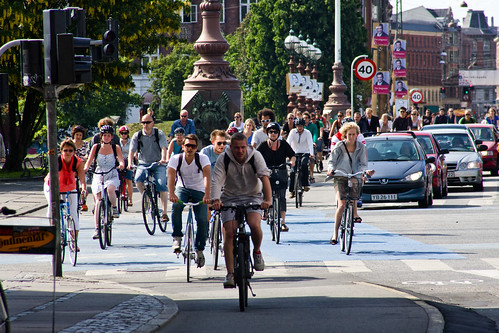
 By coincedence I’ve found myself explaining Cycling’s Secret Sect to a couple of colleagues on two separate occasions over the past couple of months. Bicycle planners the both of them. Neither had heard of the group before and in both situations the discussion was whether or not countries like America and the UK would ever get on the bicycle bandwagon in any great numbers, as well as why they haven’t done already.Especially considering the fact that so many cities and towns in Europe have rapidly and impressively increased the numbers of everyday cyclists of the course of two short years.
By coincedence I’ve found myself explaining Cycling’s Secret Sect to a couple of colleagues on two separate occasions over the past couple of months. Bicycle planners the both of them. Neither had heard of the group before and in both situations the discussion was whether or not countries like America and the UK would ever get on the bicycle bandwagon in any great numbers, as well as why they haven’t done already.Especially considering the fact that so many cities and towns in Europe have rapidly and impressively increased the numbers of everyday cyclists of the course of two short years.
The secret sect I'm referring to is known in some circles as Vehicular Cyclists and is largely unknown in most international circles. I've had a draft of this article for a while but reading this post over at Crap Cycling in Waltham Forest yesterday made me dig it out.
I explained this Vehicular Cycling theory to my colleagues in brief. Saying that this group fight tooth and nail against virtually any form of separated bicycle infrastructure because their theory is based up on the premise that bicycles are 'vehicles' and therefore should act as the vehicles in the traffic, using the car lanes just like cars. The first colleague, upon hearing this explanation, merely said, "Do these people hit their children, too?"I couldn't confirm that they did, but I suggested that they made 'vroom vroom' sounds when cycling in traffic.Both agreed that this theory was quite far-fetched and I tend to agree. Since then I've asked some other colleagues at the Traffic Dept here in Copenhagen about Cycling's Secret Sect and the responses started with sighs and rolling of the eyes.After talking with so many bicycle advocates at Velo-City from around the world, I can understand that these Vehicular Cyclists are regarded in many areas as a frustrating deterrent to mainstreaming cycling. "A cold-sore that just won't go away", in the words of a German colleague. "Kinda like those vuvuzela horns at the World Cup", said his colleague.Goodness. What a lot of strong opinions about a relatively unknown group.It is a small, yet vocal, group that is male-dominated, testosterone-driven and that lacks basic understanding of human nature. They expect that everyone should be just like them - classic sub-cultural point of view - and that everyone should embrace cycling in traffic and pretending they are cars. They are apparently uninterested in seeing grandmothers, mothers or fathers with children or anyone who doesn't resemble then contributing to re-creating the foundations of liveable cities by reestablishing the bicycle as transport.Calling them a Sect is cheeky, sure. But so many aspects of this group resemble a sect. They have a Guru or two, whom they seem to worship. There's John Forester in the US and John Franklin, to a lesser extent, in the UK. Their numbers are few but they are noisy. They are aggressive. And their influence is destructive.The theory about Vehicular Cycling has been around for more than three decades. The reason that vehicular cycling can not be considered any more than a theory is quite simple.There is nowhere in the world where this theory has become practice and caused great numbers of citizens to take to the roads on a daily basis. It remains a theoretical manifesto for a fringe group of cyclists. They often refer to themselves as 'bicycle drivers'. Vroom Vroom.I asked a leading American bicycle advocate about vehicular cycling and he said, "They have had around 35 years to prove that it works. They haven't be able to. It's time to shelve the idea."Vehicular cycling, in the countries where the theory is popular, has done little for mainstreaming urban cycling and reestablishing the bicycle as a feasible, accepted and respected transport form, as it used to be.This is largely because the theory appeals to very few cycling enthusiasts who like to go fast. Going 'fast' is apparently important. This theory is also referred to as Effective Cycling and you can read that "Effective Cycling is Safer, Faster, and More Fun!" on the website of the theory's founder, John Forrester.

The group has a Wikipedia page that they guard fervently and where you can read about the theory. While we're linking to Wikipedia, here's a link to the Flat Earth Society.
The vast majority of Homo sapiens in countries without bicycle infrastructure share roads with cars by necessity, not choice. If we once again refer to the analogy of Ignoring the Bull, the vehicular cyclist crowd are the Pamplonans of cycling. They enjoy running with the bulls. Great for them. Completely and utterly useless for the rest of society, not to mention the Common Good, public health, liveable cities.
The group rejects bicycle infrastructure - it's not for them. Unfortunately, they often stand in the way of getting regular citizens onto bicycles. They come up with all manner of excuses when someone mentions Denmark or the Netherlands and the fact that infrastructure actually gets large numbers of people onto bicycles. "Won't work here", they say. They manipulate studies about the safety of infrastructure and actually spin it to the extreme, calling bicycle lanes 'dangerous'. They have a selective memory and never seem to mention all the bicycle infrastructure in the the early part of last century.They are unable to see that when you have a large percentage of the population riding bicycles, the benefits to society are overwhelmingly positive. They are also blind to the developments in Emerging Bicycle Cultures like French cities, Spanish cities and even cities like Dublin, Portland, New York, Philadelphia, etc etc. People are returning to the bicycle thanks to infrastructure and taming of the bull. All over the world.Their guru, John Forester, on a forum earlier this year, went so far as to cave in. Effectively giving up. It has been remarked on some of these lists that I, Forester, have given up with respect to governmental negotiation in bicycling affairs. That is not so. but I need to make my position clear. I have concluded that the political power of the bicycle advocates is so strong that we bicycle drivers are unable to prevent most of what these bicycle advocates advocate. Where they propose items that have many traffic-operational defects we may be able to prevent such items being approved and installed. Bike boxes seem to be the current candidates for this position. However, I am not optimistic about our ability to prevent even such monstrosities as bike boxes, given the political power pushing them.I have concluded that we bicycle drivers should concentrate our energy on revitalizing and preserving our right to operate as drivers of vehicles. I know that it sounds social to argue that those who desire incompetent and therefore dangerous bicycle transportation, on the basis that anti-motoring trumps cyclist safety and efficiency, ought to be allowed to have their way, since there is no practical way of stopping them. But that's the world as it is. We have tried for thirty five years now to change society to a bicycle driving policy, and society not only has defeated us at every turn but has developed more ways of preventing or discouraging bicycle driving. We must devote our efforts to both preserving what we still have, and reversing the legal (I don't bother about the social aspects) discriminations that work to prevent bicycle driving.Why don't I bother about the social aspects? First, hoping to change American social opinion against bicycle driving is hopeless. Second, we can live with the occasional nastiness from motorists; after all, that has been present since, probably, the 1930s. Yes, some of us think that American social opinion opposing bicycle driving is a deterrent to cycling in general, and should be opposed because it makes cycling unpopular. However, nothing that we do in that respect will make bicycle driving popular; it will only assist in making cyclist-inferiority cycling more popular, because that's what the public wants. And this consideration has the same reservation that all our political efforts have, that we haven't a hope in Hell of changing American public opinion away from opposing bicycle driving. Don't waste effort on what has to be futile; concentrate the effort where it is most necessary, preserving our right to operate as drivers of vehicles.
Infrastructure. That's what the public wants. Reading his text one is struck by the tone. Another example of the sect-like approach of the group. 'We' are right and yet 'we' are misunderstood. 'They' oppose us. Etcetera.On the Wikipedia page about Sects, the English sociologist Roy Wallis argues that a sect is characterized by “epistemological authoritarianism”. According to Wallis, “sects lay a claim to possess unique and privileged access to the truth or salvation and “their committed adherents typically regard all those outside the confines of the collectivity as 'in error'”.
The American sociologists Rodney Stark and William Sims Bainbridge assert that "sects claim to be an authentic, purged, refurbished version of the faith from which they split". They further assert that sects have, in contrast to churches, a high degree of tension with the surrounding society.Here's an interesting blogpost from a Citizen Cyclist in the UK battling with the Pretend you're a car theory.

Let's get to work.





